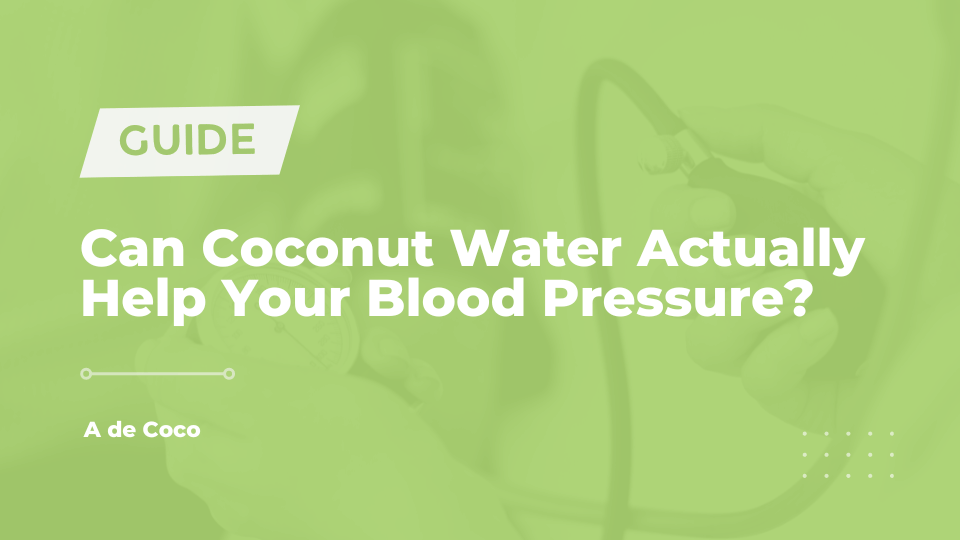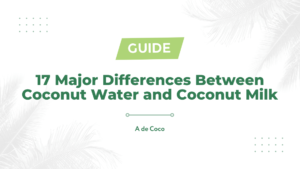There is an ongoing debate on the potential health benefits of various natural drinks, one of them being coconut water.
Often lauded for its hydrating properties and nutritional value, this refreshing tropical beverage has drawn considerable attention in the scientific realm.
Many studies have sought to explore its potential therapeutic applications, including the ability to moderate blood pressure levels.
However, despite widespread usage, the empirical evidence backing such claims is not always cut-and-dried.
This has led many to question, how efficacious is coconut water in relation to blood pressure management?
This discussion delves into scientific research reports, attempting to uncover the reality behind these popular claims.
Contents
- Can Coconut Water Actually Help Your Blood Pressure?
- Understanding Blood Pressure: Causes, Symptoms, and Complications
- How Potassium, Magnesium, and Vitamin C Affect Blood Pressure
- What Is Coconut Water: Nutritional Profile and Health Benefits
- Links Between Coconut Water and Blood Pressure Management
- How to Incorporate Coconut Water into Your Diet
- Regular Consumption of Coconut Water and The Effects on Blood Pressure
- Comparing Coconut Water with Other Natural Drinks
- Possible Risks and Side Effects of Consuming Coconut Water
- The Bottom Line
Can Coconut Water Actually Help Your Blood Pressure?
Yes, coconut water can potentially help your blood pressure. According to studies, it is rich in potassium, magnesium, and vitamin C which are nutrients known to help lower blood pressure. However, individuals with high blood pressure should consult with a healthcare professional before incorporating it into their diet.
Digging deeper into this subject, it is crucial to understand how these nutrients found in coconut water interact with our body and contribute to better cardiovascular health.
We’ll also be exploring other benefits of this natural drink and how it can enhance overall wellness.
Furthermore, we’ll consider some potential risks or side effects that might be associated with its consumption.
This holistic view might serve as a comprehensive guide to both the advantages and disadvantages of incorporating coconut water into your dietary regimen.
With a broad perspective, one can make an informed decision on the use of coconut water for health purposes.
Understanding Blood Pressure: Causes, Symptoms, and Complications
Blood pressure is the force exerted by circulating blood against the walls of the body’s arteries. It is a critical part of how the heart and circulation works.
There are two parts to blood pressure: systolic and diastolic. The systolic pressure is the first number in a blood pressure measurement and represents the force your heart exerts when beating.
The diastolic pressure, the second number, is the pressure in the arteries when the heart relaxes between beats.
Causes of High Blood Pressure
There are many potential causes of high blood pressure, ranging from genetic factors, age, and race to lifestyle choices like diet, physical activity level, and tobacco and alcohol use.
Chronic conditions like kidney disease, diabetes, and certain endocrine and vascular disorders can also play a role in developing high blood pressure.
Stress and certain medicines, such as birth control pills or over-the-counter cold relief medications, can elevate blood pressure as well.
A healthy lifestyle plays a crucial role in maintaining normal blood pressure and thus, preventing cardiovascular diseases.
This emphasizes the importance of healthy dietary choices, regular exercise, moderation in alcohol consumption, and avoidance of smoking.
Specific dietary choices like limiting sodium intake, increasing consumption of fruits and vegetables, and getting enough dietary potassium can have a direct impact on blood pressure.
Symptoms and Complications of High Blood Pressure
High blood pressure often has no warning signs or symptoms, which is why it’s usually referred to as the “silent killer”.
However, in some cases, high blood pressure can cause symptoms like headaches, shortness of breath, dizziness, chest pain, palpitations of the heart, and nosebleeds, but these are rarely noticed until high blood pressure has become severe or life-threatening.
Complications from high blood pressure can lead to serious health conditions like heart disease, kidney disease, stroke, and heart failure.
In this video, you’ll find a detailed explanation of how magnesium affects blood pressure. It also covers how you can incorporate magnesium-rich foods into your diet to help manage blood pressure.
Monitoring blood pressure is crucial because it can lead to many dangerous health conditions if not managed properly.
Doctor consultation is necessary if you have high blood pressure; they can guide you about the right treatment and lifestyle changes.
Proper medication, paired with lifestyle changes, can prevent, delay, or reduce the need for medication.
Remember, early detection is the key. So, regular blood pressure check-ups are crucial.
How Potassium, Magnesium, and Vitamin C Affect Blood Pressure
Understanding the correlation between nutrients and blood pressure management is crucial for optimal health. For instance, Potassium, Magnesium, and Vitamin C are key players that can significantly affect blood pressure levels.
The Role of Potassium
Potassium is a vital mineral that plays a major role in maintaining normal blood pressure. It does this by balancing out the negative effects of salt and aiding the smooth muscle cells that line the blood vessels to relax. When your body has enough potassium, it can help to reduce high blood pressure.
A lack of potassium in the diet may contribute to developing high blood pressure, especially when combined with an excess intake of salt. Therefore, incorporating sufficient amounts of potassium-rich foods in the daily diet is recommended for blood pressure regulation.
The balance between potassium and sodium is crucial in controlling blood pressure.
This balance isn’t just about increasing the amount of potassium consumed but also about monitoring and reducing sodium intake. The key is to achieve a healthy balance to maintain blood pressure at optimum levels.
Blood Pressure and Magnesium
Similar to potassium, magnesium is also a significant mineral when considering blood pressure levels. It holds a key role in more than 300 body mechanisms, including blood pressure regulation.
Research suggests that there is a correlation between low magnesium levels and higher blood pressure readings. This means maintaining healthy magnesium levels could help control blood pressure.
Magnesium deficits have been linked with hypertension, which highlights its critical role in blood pressure management.
Medical research indicates that magnesium can relax blood vessels and potentially help to lower blood pressure levels somewhat. However, more research is required to ascertain the precise relationship and how it can be leveraged in blood pressure management.
The Impact of Vitamin C
Vitamin C, also known as ascorbic acid, is a water-soluble vitamin known for its antioxidant properties. Emerging research suggests that Vitamin C might play a role in blood pressure regulation.
While the exact relationships are still being examined, preliminary research indicates that vitamin C could help lower systolic and diastolic blood pressure.
As Vitamin C is an antioxidant, it might help prevent oxidative damage that contributes to heart diseases and hypertension.
Further research is indeed necessary to validate these potential health benefits, but the existing studies suggest Vitamin C might support healthy blood pressure levels.
In conclusion, nutrients play a significant role in blood pressure management, with Potassium, Magnesium, and Vitamin C being of particular importance. Therefore, maintaining the levels of these nutrients might help in blood pressure regulation.
What Is Coconut Water: Nutritional Profile and Health Benefits
Coconut water is the clear liquid found in the center of young, green coconuts and is naturally low in calories, fats, and cholesterol, providing a rich source of natural electrolytes such as potassium, magnesium, and calcium.
In addition to its refreshing taste, coconut water comes packed with vitamins, antioxidants, and phytonutrients that have the potential to nourish your body completely.
Nutritional Profile of Coconut Water
A typical serving size of coconut water is one cup, which contains about 46 calories and provides a notable amount of the recommended dietary intake of several essential nutrients.
Rich in vitamin C, coconut water also contains vitamins B2, B3, B5, and B6 making it a nutritional powerhouse.
Its mineral content includes calcium, iron, magnesium, phosphorus, and zinc which perform various vital functions in the body.
While coconut water is well-known for its high potassium content, it also provides small amounts of protein and fiber.
Indeed, the most distinctive aspect of coconut water’s nutritional profile is its high concentration of electrolytes, particularly potassium, which are important for maintaining body fluid balance, heart function, and preventing muscle cramps.
Therefore, coconut water’s nutrient-dense profile contributes to the multiplicity of its beneficial health effects.
Health Benefits of Coconut Water
Drinking coconut water may provide you with a range of positive health effects from improving heart health to boosting hydration.
It’s renowned as a natural remedy for dehydration, thanks to its hydrating properties and mineral content.
When it comes to supporting heart health, studies suggest that coconut water may help lower blood pressure and potentially reduce the risk of blood clots forming in your arteries.
Another one of coconut water’s benefits is its potential effects on blood sugar control.
Several scientific studies have discovered that coconut water may certainly help control glucose levels, leading to improved blood sugar control and reduced insulin resistance.
Therefore, coconut water may be an excellent beverage option for those concerned with heart health, hydration, and blood sugar management.
https://www.youtube.com/watch?v=undefined
On viewing this video, you can acquire more information regarding various dietary supplements that are beneficial for controlling high blood pressure.
Although the video focuses primarily on supplements, it mentions coconut water as a natural, food-based source of some of these beneficial nutrients.
Links Between Coconut Water and Blood Pressure Management
Coconut water has gained some attention within the scientific community for its potential role in managing high blood pressure. Significant research has taken place to test the validity of this theory, with some promising results apparent.
Nature’s “Sports Drink” and Its Effect on Hypertension
Coconut water, often touted as the “sports drink” as provided by Mother Nature, is loaded with nutrients that can help alleviate hypertension. In fact, studies have shown a link between regular intake of coconut water and reduced systolic and diastolic blood pressure.
This soothing natural beverage enriched with electrolytes—particularly potassium and magnesium—acts as a vasodilator, helping the body to maintain electrolyte balance while reducing pressure on the blood vessels.
The beneficial bioactive enzymes found in coconut water are another factor that contributes to its blood-pressure-lowering effects. They not only help digestion but also metabolize sugars and fats better, controlling the factors that can lead to hypertension.
So while coconut water might just seem like a tasty, refreshing drink, it’s actually a potential boon for those managing high blood pressure.
Studies have shown a link between regular intake of coconut water and reduced systolic and diastolic blood pressure.
This might be a surprising discovery, but it’s an intriguing possibility for those dealing with hypertension. But how real is this link? While the connection between coconut water and blood pressure management might seem straightforward, the underlying reality might be a little more complex. The impact of individual nutrients, for instance, varies from person to person. Despite these nuances, the research backs up the hypertension-busting claims of coconut water quite consistently.
The Clinical Studies: A Closer Look
Over the years, several clinical studies have backed the role of coconut water in lowering blood pressure. In one such study, subjects with hypertension who consumed coconut water for two weeks observed a significant reduction in systolic blood pressure. Within the same study, those with high concentrations of blood cholesterol also saw some promising improvements.
Another clinical trial saw subjects consuming coconut water daily for 12 weeks. The result? A remarkable reduction not only in systolic and diastolic blood pressure but also in fasting glucose levels. This indicates the potential usefulness of coconut water in managing not just hypertension but also metabolic syndrome.
However, it’s worth noting that not all studies observed consistent results. This could possibly stem from the exact natural composition of the coconut water consumed – variables such as geographical origin and the maturity of the coconut can affect the nutrient composition of the water.
Subjects with hypertension who consumed coconut water for two weeks observed a significant reduction in systolic blood pressure.
This snippet of evidence really illuminates the potential of coconut water in managing hypertension. While the evidence is compelling, it’s essential to remember that all bodies react differently, and what works for one person might not work for another. Thus, while these studies certainly validate the links between coconut water and blood pressure, they by no means suggest that coconut water is a standalone cure for hypertension.
How to Incorporate Coconut Water into Your Diet
Coconut water, often deemed as nature’s own sports drink, is packed full of nutrients and antioxidants, and is incredibly hydrating due to its high electrolytes, like potassium and magnesium. As such, it can be an excellent addition to your diet, especially if you’re looking to manage your blood pressure naturally. Below, we explore some ways on how to incorporate this tropical beverage into your daily routine.
As a Drink to Start Your Day
Taking coconut water on an empty stomach right after you wake up can be a healthy way to kickstart your metabolism for the day. The natural sugars in it will give you an energy boost, and its high potassium content can help regulate your blood pressure levels.
Moreover, the magnesium in coconut water might work to relax your blood vessels, improving circulation and reducing blood pressure levels. This can set a healthy tone for the rest of the day’s activities, especially if they’re cardio-heavy.
Post-Workout Hydration
Coconut water is renowned for replenishing lost electrolytes during physical activities. It’s rich in potassium, magnesium, and low in sodium, making it a much healthier alternative to commercial sports drinks.
Drink it after your workout to rehydrate your body, restore the electrolytes lost through sweat, and contribute to natural blood pressure regulation.
It’s rich in potassium, magnesium, and low in sodium, making it a much healthier alternative to commercial sports drinks.
That’s important because maintaining adequate hydration levels, as well as replacing electrolytes, can help in managing blood pressure. Patrons of physical fitness will find coconut water an excellent, natural hydrator that not only energizes but also contributes to overall health.
Mix it in Your Smoothies
Perhaps the easiest way to incorporate coconut water into your diet is by using it as a base for your health smoothies. You can blend it with your favorite fruits for a nutritious and flavorful drink. Besides, the natural sweetness of coconut water might reduce the need for added sugars, making your smoothie healthier.
In this video, you’ll learn more about the effects of diet and lifestyle on blood pressure. Plus, get insight to natural methods, including dialing in on foods like coconut water, to manage it effectively.
Use it in Cooking
Coconut water can add a refreshing touch to your meals. Known for its sweet, nutty flavor, coconut water can be used to cook rice and other grains, giving them an exotic twist. The magnesium and potassium infused grains can aid in blood pressure management.
Lastly, remember that while coconut water can contribute to healthier blood pressure levels, it should not replace medical advice or prescribed treatment. Consult your doctor before making any substantial changes to your diet, especially if you have a history of high blood pressure or other health conditions.
Regular Consumption of Coconut Water and The Effects on Blood Pressure
Coconut water has recently been in the limelight due to its potential health benefits, particularly in relation to blood pressure management.
While it was traditionally consumed mainly in tropical nations, the drink has gained global popularity over the years .
This is largely due to its rich nutritional profile, which includes beneficial components such as potassium, magnesium, and vitamin C.
Role of Potassium in Regulating Blood Pressure
One of the notable constituents of coconut water that is of particular interest when it comes to blood pressure management is potassium.
Several studies have evidenced that potassium plays a pivotal role in blood pressure control.
It was seen that increasing the intake of this vital mineral can assist in lowering high blood pressure.
Note, however, that while potassium can prove beneficial for people with hypertension, those with kidney disease may need to be cautious as their kidneys may not be able to remove excess potassium from the blood.
Apart from individuals with kidney ailments, most adults are recommended to take in about 4,700 milligrams of potassium per day.
Consuming the recommended daily intake can help maintain a healthy blood pressure level and potentially prevent or manage hypertension.
How Coconut Water Contributes to Potassium Intake
Now, where does coconut water fit into this picture?
Coconut water can be a great source of potassium with one cup offering approximately 600 milligrams, which is a significant contribution towards the daily recommended intake.
“Coconut water can be a great source of potassium with one cup offering approximately 600 milligrams”
This fact predominantly cements the position of coconut water as a potentially beneficial drink for blood pressure management.
However, this does not mean that drinking endless glasses of coconut water is the solution to hypertension.
While it’s a healthful addition to your diet, it shouldn’t be the sole strategy for managing your blood pressure as diet is just one piece of the puzzle in blood pressure management, and a balanced, overall approach is always advised.
Coconut water Is Not a standalone solution
It’s important to remember that while coconut water can contribute to potassium intake and thus potentially aid in blood pressure control, it should not be seen as a stand-alone treatment for hypertension.
No single food or drink can ‘cure’ hypertension, and it’s crucial to combine a balanced diet with other healthy lifestyle habits like regular physical activity, moderation in alcohol consumption, and maintaining a healthy weight.
An individual’s unique health situation should also be considered, and one should always consult with their healthcare provider before making significant changes to their diet or lifestyle.
This is especially important for those on blood pressure medicine, as some nutrients can interact with medications.
Despite its potential benefits, coconut water should not replace medical treatment and patients are always advised to seek medical advice and interventions as the first course of action in managing blood pressure conditions.
Comparing Coconut Water with Other Natural Drinks
When it comes to natural drinks for managing blood pressure, there are quite a few alternatives to coconut water. While coconut water has gained popularity for its potential benefits in blood pressure control, there are other beverages that demand our attention too.
Some of these include beetroot juice, hibiscus tea, and green tea, among others.
Beetroot Juice and Blood Pressure Management
One significant player in this arena is beetroot juice. Multiple studies have shown that beetroot juice can lower blood pressure in people with hypertension, primarily due to its high content of dietary nitrates.
These nitrates can then be converted into nitric oxide, a molecule that dilates blood vessels and subsequently lowers blood pressure.
However, it’s worth noting that beetroot juice has a strong flavor that some people may not enjoy. To combat this, it can be mixed with other fruit juices for a more palatable experience.
These nitrates can then be converted into nitric oxide, a molecule that dilates blood vessels and subsequently lowers blood pressure.
This dilating effect of nitric oxide on blood vessels highlights the crucial role diet can play in managing blood pressure. Unlike medication, dietary changes don’t typically present side effects, instead offering overall health benefits.
Hibiscus Tea and Blood Pressure Management
Another noteworthy naturally beneficial beverage is hibiscus tea. Studies have found that consuming hibiscus tea regularly can reduce systolic and diastolic blood pressure.
The powerful antioxidant compounds in hibiscus are believed to be responsible for the blood pressure-lowering effects.
The same as with beetroot juice, incorporating hibiscus tea into a daily routine could be an accessory strategy to decrease blood pressure levels, in addition to being a comforting, enjoyable ritual.
The powerful antioxidant compounds in hibiscus are believed to be responsible for the blood pressure-lowering effects.
Again, the ideal is achieving a balance where lifestyle changes, physical activity, and a balanced meal plan, inclusive of natural drinks, can work synergistically for a healthier life.
In the embedded video, there’s an in-depth discussion on potassium’s importance in blood pressure management. This could be helpful if including potassium-rich drinks like coconut water in your diet.
Certainly, the choice of drink when it comes to managing blood pressure may come down to personal preference, accessibility, and taste. However, draw from this that a multi-faceted approach is always best – these beverages alone may not do much in isolation, but if combined with other lifestyle changes like healthy eating and regular exercise, they may exhibit beneficial effects on blood pressure.
Possible Risks and Side Effects of Consuming Coconut Water
While coconut water is often praised for its array of health benefits, it’s also important to consider the possible risks and side effects associated with its consumption.
Electrolyte Imbalance
Coconut water is high in potassium, a nutrient that plays a key role in maintaining heart function and muscle contraction.
However, excessive potassium intake can lead to a condition known as hyperkalemia, which can potentially be life-threatening if it causes the heart to stop.
This is especially true for people who have kidney problems or are on certain medications, as their bodies may have difficulty regulating potassium.
Therefore, it’s crucial to drink coconut water in moderation and consult your healthcare provider if you have any existing health conditions or are on medications.
Despite its health benefits, coconut water should not be used as a substitute for medical treatment, and its consumption needs to be monitored to avoid excessive intake of potassium.
Allergic Reactions
Although rare, some people may be allergic to coconuts or coconut water.
It’s important to be aware of this risk, especially if you’ve never consumed coconut water before.
Typical allergy symptoms can include hives, itching, swelling, and severe difficulty breathing.
If you are allergic to tree nuts, you may be at a higher risk of having an allergic response to coconut water.
Although rare, some people may be allergic to coconuts or coconut water.It’s always wise to try a small amount of coconut water initially to gauge your body’s response.
If you experience any allergic symptoms, stop drinking it immediately and seek prompt medical attention.
Calories and Sugar Content
Another potential downside of coconut water is its calorie and sugar content.
Although it’s healthier and less calorie-dense than most soft drinks and juices, it’s still not calorie-free.
Drinking large quantities of coconut water could contribute to daily calorie surplus leading to weight gain.
Another potential downside of coconut water is its calorie and sugar content.Furthermore, while the sugars in coconut water are naturally occurring, it’s still crucial to factor this into your daily intake, especially if you are diabetic or watching your sugar intake.
Hence, as with any beverage, it’s important to consume coconut water in moderation and as part of a balanced diet.
The Bottom Line
Drawing together the research and insights elucidated in this article, it is evident that coconut water, with its potent composition of potassium, magnesium, and vitamin C, has a significant impact on blood pressure management.
Scientific research has begun to support the anecdotal evidence, showcasing the potential of coconut water to combat hypertension, a dangerous condition that plagues many globally.
Incorporating coconut water into your diet regularly can prove beneficial, although it should be compared with other natural alternatives for a comprehensive approach.
However, potential risks and side effects need to be considered to maintain overall health.
Individuals and medical experts alike affirm the value of coconut water for controlling blood pressure, yet also underscore the importance of consulting a healthcare provider and not relying solely on this for treatment.
Limitations aside, the multi-faceted benefits of coconut water make it a remarkable contender in the realm of natural solutions for blood pressure management.




